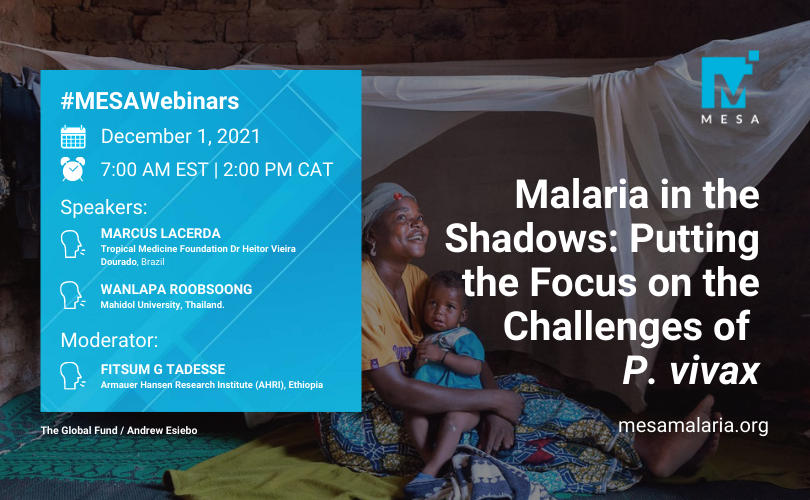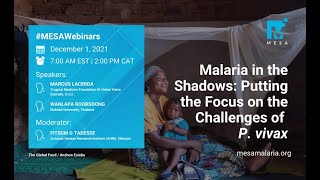MESA Webinar 6 – Malaria in the Shadows: Putting the Focus on the Challenges of P. vivax
Published: 16/12/2021
This report is brought to you by the MESA Correspondents Nkemngo Francis Nongley, Vita Mithi, Faith Hungwe, and Ana Alonso.
THEMES: THEMES: P. vivax
Opening remarks
The 6th MESA webinar on Science for Malaria Impact was coordinated by Nana Williams who welcomed everyone and introduced the moderator of the session, Fitsum Tadesse, a leading scientist at the Armauer Hansen Research Institute (AHRI), Ethiopia, who studies the transmission of Plasmodium parasites from humans to mosquitoes. Fitsum then profiled the speakers: Marcus Lacerda and Wanlapa Roobsoong.
“Plasmodium vivax radical cure: how can we improve it?”
Marcus Lacerda (Physician researcher at the Tropical Medicine Foundation Dr Heito Vieira Dourado, Brazil) commenced by highlighting the major challenge for achieving the radical cure of P. vivax in Brazil which is responsible for 85% of the malaria cases. This challenge stems from the reactivation of dormant liver hypnozoites that cause relapses after 6 months of treatment, making it difficult to achieve parasite clearance. Although antimalarial drugs such as Primaquine (PQ) and Tafenoquine (TQ) are effective in killing the liver stages, the lack of therapeutic compliance constitutes a barrier in achieving elimination. Preliminary findings from the Brazilian Ministry of Health (MoH) demonstrated that direct supervision of PQ treatment uptake led to an efficacy of 90% against recurrent infections as opposed to 60% efficacy when treatment was not supervised This striking gap in efficacy was due to non-compliance, since patients tend to abandon treatment 3 days after the symptoms disappear. Therefore, the key challenge is achieving a radical cure through daily administration of PQ tablets to patients without supervision, in order to minimize the logistic and workforce burden on the health system. To evaluate the MoH strategy of TQ implementation, this observational study design investigated whether P. vivax patients ≥ 16 years of age are correctly treated with TQ according to the appropriate level of glucose-6-phosphate dehydrogenase (G6PD), present in 5% of the population. This two-phase project recruited a multidisciplinary health team to screen for G6PD deficiency before delivering the drug to 600 new P. vivax cases in high and medium level facilities in the 1st phase as well as low-level facilities in the 2nd phase. The study established close communication with local health secretaries and health managers for reporting malaria and acute hemolytic anemia. Also, a diversity of training and educational materials to facilitate the test-and-treat process were included. Qualitative findings from health professionals revealed that supervised TQ contributes to treatment adherence, pipetting was the main error encountered when performing the test, and lack of G6PD screening was a challenge. Similarly, malaria patients indicated that single-dose treatment with TQ was a better option although they need to better understand the relationship with G6PD testing. In conclusion, testing for G6PD deficiency in P. vivax patients and treatment with TQ improved compliance and showed remarkable efficacy in high-medium level hospital settings.
Mass Primaquine Preventive Treatment in Thailand: acceptability and feasibility study
Wanlapa Roobsoong (Mahidol Vivax Research Unit, Faculty of Tropical Medicine, Mahidol University) started by highlighting the various interventions aiming for malaria elimination, with emphasis on targeting hypnozoite carriers and asymptomatic cases of P. vivax through mass screening with highly sensitive diagnostic tests and treatment with drugs such as PQ. This study, conducted in a malaria-endemic region, involved both a Mass Primaquine Preventive Treatment (MPPT) strategy in the Southern part of Thailand and a cross-sectional G6PD testing strategy in both the Southern and Western parts of Thailand, delivered through a mass drug administration (MDA) approach. Capillary blood was collected from three sites and analysis was done within 24 hours to detect for G6PD deficiency using spectrophotometry, biosensor and RDT detection methods. Using the RDT detection method, the prevalence of G6PD deficiency in the Western and Southern sites was 61% and 66% respectively, with a higher proportion of males affected. The G6PD diagnostic performance showed that RDTs were more reliable in addition to their cost-effectiveness. RDTs were then implemented to cluster the subjects to evaluate the acceptability, feasibility and effectiveness of MPPT in addition to the national standard of care. This phase involved the administration of a low dose of PQ (0.25mg/kg) for 14 days after which malaria prevalence was determined by qPCR. The study design comprised a 2-arm cross-over clustered randomized control trial involving two groups where the 1st group was administered Standard Prevention and Control (SPC) plus MPPT followed by SPC one year apart. Meanwhile, the 2nd group received only SPC in year 1 and SPC + MPPT in year 2. For each year, mass blood screening (MBS) + G6PD testing was done to select eligible patients for PQ administration in the MDA group, whereas non-MDA groups were only subjected to MBS without receiving PQ. Findings from this project revealed a high population coverage during the 14-day regimen in Round 1 (87%) and Round 2 (92%) treatment schedules. The Hb level did not change over the 28-course PQ treatment follow-up, although a drop below ˂ 8g/dl, as well as black urine side effects, were observed. A significant reduction in P. vivax prevalence was recorded for both SPC + MPPT interventions within the two years period. This study demonstrated that a single round of PQ achieved a high efficacy in reducing the clinical malaria cases between the study sites.
Closing remarks
Fitsum Tadesse congratulated the speakers for their clear presentations and relevant research work. He opened the stage for questions and answers, and the presenters responded to the various questions asked by the audience. Furthermore, Nana Williams commended the speakers for the wonderful talks and discussion and thanked the attendees for their participation. Finally, she expressed gratitude to the moderator and closed the last webinar session of the year.
This report is brought to you by the MESA Correspondent Nkemngo Francis (Centre for Research in Infectious Diseases – CRID, Yaoundé and University of Buea, Buea, Cameroon). Senior editorial support has been facilitated by Adelaida Sarukhan (Barcelona Institute for Global Health – ISGlobal, Spain).
Published: 16/12/2021
This report is brought to you by the MESA Correspondents Nkemngo Francis Nongley, Vita Mithi, Faith Hungwe, and Ana Alonso.
THEMES: P. vivax



